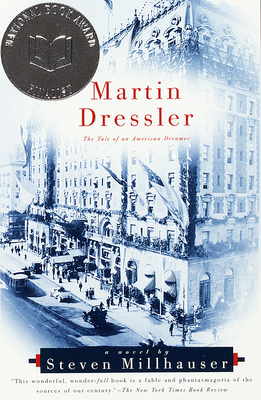Millhauser has a very different style of story-telling, and it was quite intriguing throughout the first half of the book. Martin's opinions about life are brought to light early on, beginning with the ways he goes about improving business at his father's cigar shop and continuing when he tells an employee "You're any kind of man you damn well want to make yourself." He doesn't have an end goal for his life, like many entrepreneurs; there isn't one single accomplishment that will satisfy the yearning to get more out of life than it wants to give.
Not solely gifted with drive and ambition, there were certain things that Martin understood about people. When it came to improvements at the hotel he was working in, he knew that "People needed to be assured that they weren't missing the latest improvements, while at the same time they wanted to be told that nothing ever changed." Conversely, there were things about his own life that he did not see clearly at all. After he moves from his parents house, they are out of the picture. When women enter his life, they are seen vaguely, as if part of a dream. Even in his business projects, there is a certain mystery to his decisions; he is taken by his whims more often than not.
Martin knew that what attracted him wasn't the actual lunchroom, for he had no passion for lunchrooms, no special fondness for them, in a sense no interest in them; his passion was for working things out, bringing things together, arranging the unarrangeable, making combinations.
 For all that this book is about one single person, we see his life at a distance--held away from forming a personal connection that would enable us to sympathize with his plight and rejoice in his success. By the second half of the book I was beginning to become bored. The story becomes bogged down with his building projects to some extent. As the ending spiraled into a deeper sort of magical realism, I simply didn't care anymore. Which is sad, because Martin Dressler's world was vivid, and his aspirations provided a fascinating peek into the entrepreneurial mind.
For all that this book is about one single person, we see his life at a distance--held away from forming a personal connection that would enable us to sympathize with his plight and rejoice in his success. By the second half of the book I was beginning to become bored. The story becomes bogged down with his building projects to some extent. As the ending spiraled into a deeper sort of magical realism, I simply didn't care anymore. Which is sad, because Martin Dressler's world was vivid, and his aspirations provided a fascinating peek into the entrepreneurial mind.Whether you leave the book with the firm opinion that chasing your dreams is an empty pursuit or with the conviction that it takes all kinds of people to make the world go round, you won't regret having experienced the burgeoning city and the endless possibilities alongside Martin Dressler. If nothing else, you should open it up just to find the 4-page sentence. (no joke. it was quite noticeable since most of the book had pretty short chapters a moved along nicely.) My desire for turn-of-the-century cities hasn't been completely satiated, however, so I'm hoping to get to another Pulitzer soon that may help in that department: the winner from 1925, So Big by Edna Ferber. Should be an interesting comparison, no?

HA, I just noticed your rating system. I love it!
ReplyDelete